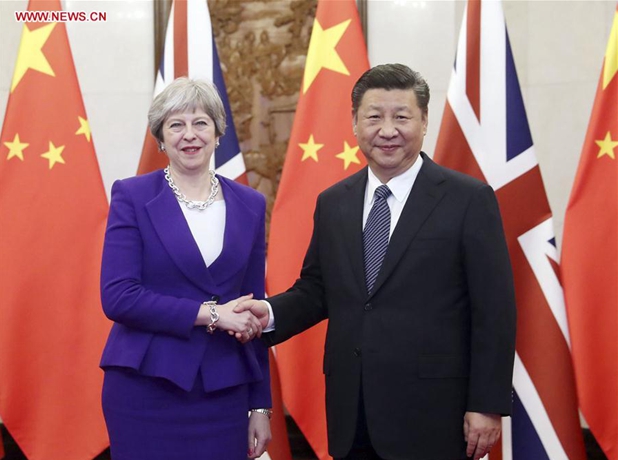PM May's global Britain poised to gain from Chinese investment
- By Sumantra Maitra
 0 Comment(s)
0 Comment(s) Print
Print E-mail China.org.cn, February 8, 2018
E-mail China.org.cn, February 8, 2018

Chinese President Xi Jinping (R) meets with visiting British Prime Minister Theresa May in Beijing, capital of China, Feb. 1, 2018. [Photo/Xinhua]
The U.K. Prime Minister Theresa May's recent trip to China was a good one; her visit succeeded in making her slogan of a "post-Brexit global Britain" a reality. May was quoted by the BBC as saying, "We will be out there ensuring the deal we get delivers on what the British people want. That's what this is about and I know what the British people want as well is good jobs for themselves and their children, and that's why it is important for me to be here in China where businesses have been signing deals." In spite of her statement, May's position back home is shaky, with a possible turf war brewing between the hard Brexiters and those who want to keep strong ties with Europe.
China, meanwhile, is the only major non-Western world power out of the British Commonwealth that enjoys great confidence among Britain's ruling class. The British political system is notoriously divided in nearly every respect, but perhaps this is one dimension where there remains a semblance of sanity and bipartisanship. For example, the erstwhile Remainers, like former PM David Cameron and Chancellor George Osborne, started what are now known as the golden years of the Sino-British era, when trade was at the forefront. China now retains popularity with the traditionally pro-Chinese Labour Party. The Chinese Belt and Road Initiative has been popular in the United Kingdom, which was also one of the original nations to support the Asian Infrastructure Investment Bank (AIIB). Universities in the U.K. additionally have strong Chinese ties, including some with campuses in China.
Premier Li Keqiang made sure to convey to the British delegates that Brexit doesn't mean Chinese trade with the U.K. will lessen. In fact, given new openings, it may even increase. Chinese tourists now outperform other groups in the U.K., and that is expected to increase. Chinese newspapers praised May's realpolitik, given that she focused on trade over other aspects of diplomacy. The Prime Minister has even been granted an affectionate nickname in China, which is unusual in British politics but very common in Asia.
There is, however, one thing May can do to boost her talking points on "global Britain." She should remove students from her quoted immigration numbers. Chinese and Indian students, who form the bulk of legal immigrants to United Kingdom, share the culture, value the host country, respect the traditions and contribute to the economy. Most of the students are also academically minded and perform well. Unfortunately, they are lumped together with all the other economic migrants who flock to Britain.
Vince Cable, the Liberal Democrat leader, previously declared that Britain doesn't hold the cards in any trade deals with other great powers. India has made clear that any trade deal will be contingent on the reform of the visa system for Indian students in the United Kingdom. Chinese students are in a similar position; so if the U.K. wants free trade deals with China, they must be cognizant of the student population.
That said, China and the U.K. can and should be partners, especially in the field of research. The thing Britain can best offer China is high-end research, which will become increasingly rare, given current geopolitical scenarios and mounting rivalries among world powers. Britain's technology, industrial quality, world class education and financial sector could be immensely complementary to both the parties.
In a rapidly changing world, ideology matters less and less. Policy makers who refuse to accept that changed reality defy logic. Britain post-Brexit needs investment, rapid inflow of cash and solid trade alliances with great powers which are rising and capable. In return, Britain offers expertise. This is an opportunity neither side should miss.
Sumantra Maitra is a columnist with China.org.cn. For more information please visit:
http://m.keyanhelp.cn/opinion/SumantraMaitra.htm
Opinion articles reflect the views of their authors only, not necessarily those of China.org.cn.





